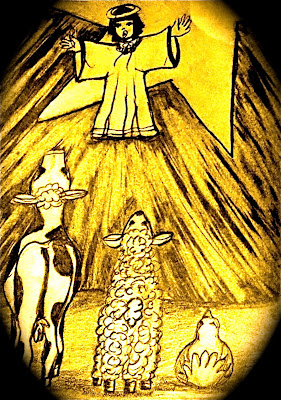
This is a photo of one of the poinsettias with which I decorate my tree.
More
Why You Say It stories behind the things we say, by Webb Garrison.
I chose poinsettia because, as you know, we identify them with the Christmas season. I know my church decorates with them during this time. My niece decorated for her Christmas time wedding with this beautiful plant.
Poinsettia - In the early 19
th century, Joel R.
Poinsett of Charleston, SC, became our first minister to Mexico.
In Mexico City he was impressed by a native plant that turned red in December. Natives called it "flower of the blessed night" because it was often at its peak on December 25.
Poinsett sent cuttings to the Smithsonian Institute and to Carolina friends. In honor of the diplomat, they called the imported flower the poinsettia.
The man who gave his name to a plant went on to become U.S. Secretary of War during the Van
Buren administration. No one, least of all the central figure of the story, anticipated that the poinsettia would become
the Christmas flower -- annually bringing him honor throughout the world.

This is an example of some of the purchasing that we did this year.
I think it is obvious why I chose the word "purchase" at this time of the year. I think that the original meaning sometimes still holds true. I'll never forget the year of the Cabbage Patch Kid Dolls when finding one was nearly impossible and the year my grand daughter wanted a Dora the Explorer house and we had lots of trouble finding one!
Purchase - Until modern times, there were no stores as we know them. Merchants occupied small booths that had no show windows or display counters. There was nothing resembling newspaper or TV advertising. consequently a person wanting a specific commodity had to get out and hunt for it.
Every successful shopping expedition was a major or minor triumph. So many difficulties were involved that the process of searching became linked with actual buying. From and Old French term meaning "seeking ardently," it was called purchasing.
So many persons chased so much merchandise so fervently that the label stuck in speech. No longer signifying an act of searching zealously, it now implies that money will pass from the hands of the purchaser to the hands of the seller -- unless both agree to use a plastic card.

This is a very fuzzy photo of one of last year's silhouettes.
I chose this word because I have been making
silhouettes. I don't understand why they were sold so cheaply, except I guess it was less expensive and quicker to do than painting a portrait.
Silhouette - Any time you see a silhouette, the stark appearance of the black outline can serve as a reminder that its name was bestowed in mockery of a penny-pincher.
Etienne
de Silhouette became controller-general of France in 1759. Selected because he was considered capable of solving the nation's financial troubles, he went to work with zeal. All of his money-saving proposals were unpopular, but his suggestion that government pensioners receive reduced allowances created a national uproar.
For generations, street artists had offered outline portraits at low prices. Since these represented an extreme example of economy in art, ridicule of the financier caused his name to become attached to them.

This is a photo of last year's children's Christmas play at church. These are the same kids as this year. The story was about finding a light for the star at the top of the town's Christmas tree.
And then there's the word, "holiday" which sadly has taken a very different meaning for lots of people from the original. There is so much "purchasing" going on that we sometimes tend to forget the reason for the holidays. However, traveling to visit family at this time of the year is a wonderful way to worship in my opinion. It is a way to thank God for the family with which we have been blessed.
Holiday - In medieval England, a holy day was designed primarily for worship and no ordinary tasks were performed. enforced leisure made it inevitable that festivals and amusements should begin to flourish at such a time. Now marked by fun and worship, old verbal elements combined and the period of observance came to be known as a holiday.
Some religious groups still emphasize a holy day at intervals, and many nations observe legal holidays on which official business is not conducted.
Hold-overs from the past remain influential. Yet the holiday notion is now strongly linked with taking a trip. Persons for whom a holy day once meant freedom from work in order to worship would be hard put to comprehend the modern holiday on wheels or in the air.
Merry Christmas
and
Best Wishes
for a
Wonderful 2010 !
to all of my blogger buddies and readers!
Julia








































































